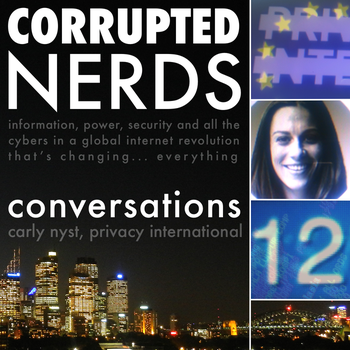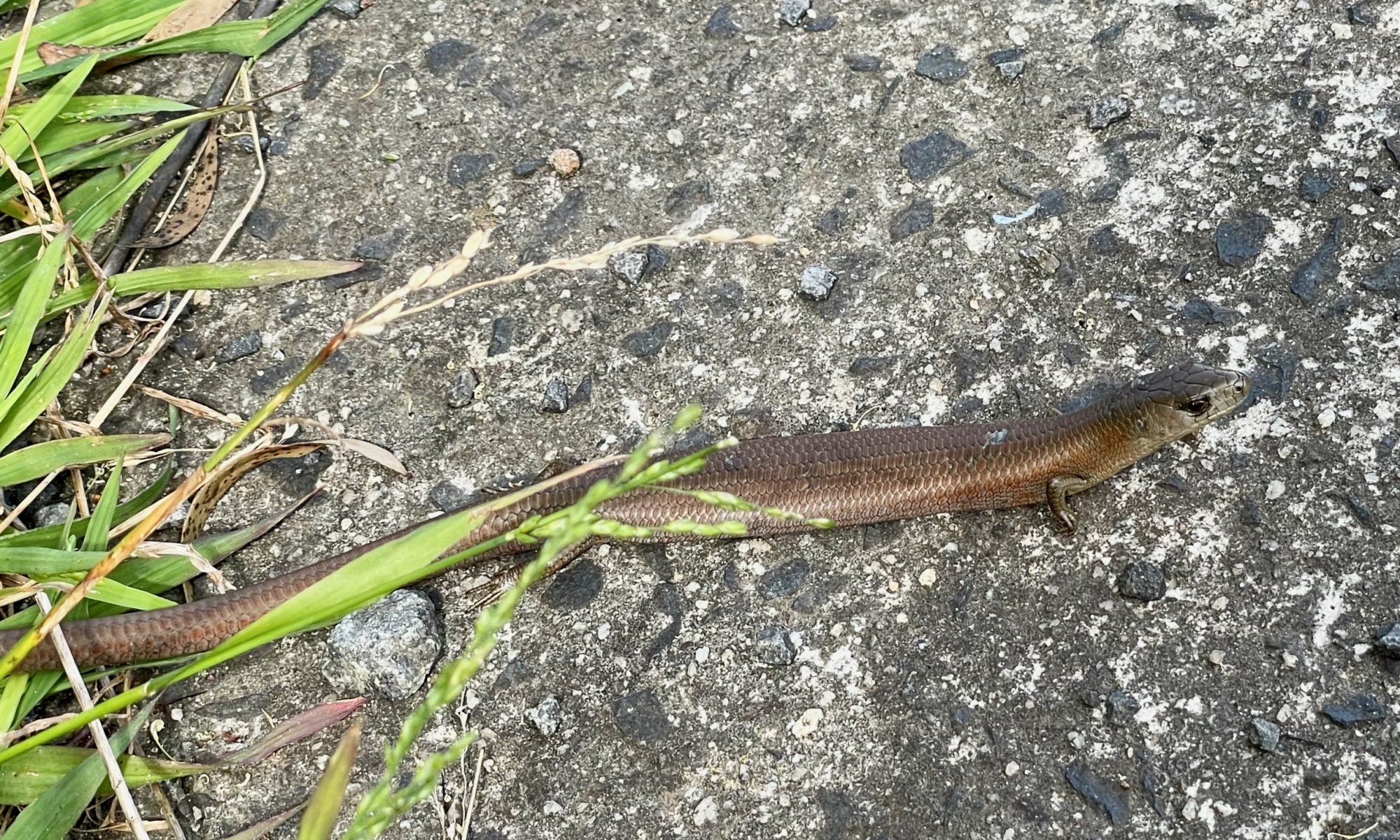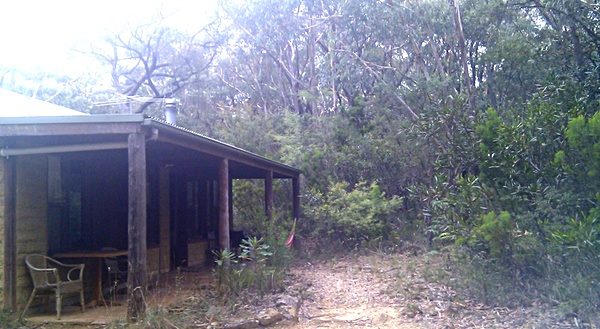Despite my original intentions, my week of Monday 27 September to Sunday 3 October 2021 was a bit of a lazy one. No articles or podcasts emerged, although there was some geek-work that you can’t see. But I did see a skink.
Continue reading “Weekly Wrap 592: A lazy week in spring that ended with a random skink”Corrupted Nerds on metadata, surveillance and privacy
 Last Wednesday I had the very great pleasure to moderate an event titled “Data Retention: the European Experience”, a public conversation with Privacy International’s legal director Carly Nyst. The audio from the event forms the latest Corrupted Nerds: Conversations podcast.
Last Wednesday I had the very great pleasure to moderate an event titled “Data Retention: the European Experience”, a public conversation with Privacy International’s legal director Carly Nyst. The audio from the event forms the latest Corrupted Nerds: Conversations podcast.
This is a live issue in Australia right now. Australia’s favourite Attorney-General, Senator George Brandis QC, has said, “This is very much the way in which western nations are going, it’s been the case in Europe under the European Data Retention directive for some little while now.” Except that’s not true.
What Brandis didn’t say was that the European Court of Justice has declared the blanket recording of telecommunications data to be a breach of human rights. It isn’t a proportionate response to the claimed threat, and there’s no evidence that it’ll actually even help.
Europe is now winding back data retention. Well, except for the UK.
In this hour-long conversation, Nyst and I discuss the legal and historical background to data retention; the risks of the blurring law enforcement and foreign signals intelligence-gathering for national security; the revelations of Edward Sowden; and whether Australia really does have robust democratic institutions which can protect us from the risks of surveillance over-reach.
The event was organised by Electronic Frontiers Australia and the Australian Privacy Foundation.
Please, listen to the entire podcast. Or, if you prefer a quick read, try my op-ed at ZDNet Australia today, Will metadata musings ever mature beyond paranoid fears?
Subscribe to all Corrupted Nerds podcasts via RSS, iTunes and SoundCloud.
If you enjoyed this podcast, why not make a tip, or even subscribe? Every contribution helps me provide these podcasts for free.
Weekly Wrap 227: No snow, no productivity
 I am not impressed with my week of Monday 6 to Sunday 12 October 2014. While I did produce a podcast, and also caught up with a friend and visited a part of Sydney that I hadn’t previously explored, it was still less productive that I’d hoped.
I am not impressed with my week of Monday 6 to Sunday 12 October 2014. While I did produce a podcast, and also caught up with a friend and visited a part of Sydney that I hadn’t previously explored, it was still less productive that I’d hoped.
There are reasons. I’ll tell you about them another time. Soon.
For completely unrelated reasons, I’ve decided to run an old photo, not a new one. Exactly two years and one day ago, it was snowing at Wentworth Falls. One year and a week ago, the place was under threat from bushfires. Welcome to Australia. It’s a stupid place.
Podcasts
- “The 9pm Mental Health Awareness Week”, being The 9pm Edict episode 30, 7 October 2014. It’s not actually about mental health or, indeed, awareness.
Articles
- Can Ello get by on a manifesto and a smiley?, ZDNet Australia, 7 October 2014.
Media Appearances
None.
Corporate Largesse
None.
The Week Ahead
There’s only one firm fixture in my week so far.
On Wednesday I’ll be in Sydney to host Data Retention: the European experience, a conversation with Privacy International’s legal director Carly Nyst. The event is being presented by Electronic Frontiers Australia in conjunction with the Australian Privacy Foundation and Privacy International. Book here.
Other than that, I have a column or two to write for ZDNet Australia, and I’ll be producing an episode of The 9pm Edict podcast, but the exact order of play is yet to be determined. Like you care.
[Photo: Waratah in the snow, photographed at Bunjaree Cottages two years ago on 12 October 2012.]
iSpy: Talking total surveillance at Sydney Writers’ Festival
 Here’s the complete audio recording of last weekend’s panel discussion iSpy at the Sydney Writer’s Festival with Tommy Tudehope, me and moderator Marc Fennell.
Here’s the complete audio recording of last weekend’s panel discussion iSpy at the Sydney Writer’s Festival with Tommy Tudehope, me and moderator Marc Fennell.
Even before Google controversially demolished the privacy walls between its various products, we were already living in the total surveillance society. With every keystroke we are voluntarily telling companies, governments and heaven knows who else an awful lot about ourselves. Should we be worried about the uses to which this information could be put?
The panel was originally inspired by my Sydney Morning Herald op-ed You are what you surf, buy or tweet, and I thought we’d also talk about some of the issues I raised in my more recent ZDNet Australia story The Facebook experiment.
But we covered a lot more, including research by Sophos that showed around 50% of people would automatically befriend anyone on Facebook, the progress of the Cybercrime Legislation Amendment Bill and the Council of Europe Convention on Cybercrime, the fact that The Greens’ Senator Scott Ludlam seems to be the only Australian politician paying attention to this stuff, using TOR to help make your web browsing anonymous, the surveillance policy split between the NSA and FBI, anonymous currencies like Bitcoin and Canada’s MintChip, Electronic Frontiers Australia, the Pirate Party Australia, Georgie Guy’s blog, and data mining company Acxiom — which in the recording you’ll hear me misspell as “Axxiom”.
Podcast: Play in new window | Download (Duration: 58:16 — 39.4MB)
The recording was made using my Zoom H4n sitting mid-way between me and Mr Tudehope, so Mr Fennell is off in the distance somewhat. But at least we have a recording.
If there are any issues you’d like to follow up, well, please post a comment.
Weekly Wrap 40
A weekly summary of what I’ve been doing elsewhere on the internets. Despite succumbing to a random fever for two or three days, I got quite a bit of writing done — and then forgot to post this until Monday. Sigh.
Podcasts
- Patch Monday episode 79, “Cybercrime convention: civil liberties risk?”. Australia intends to sign on to the Council of Europe Convention on Cybercrime. My guests? Cybercrime specialist Nigel Phair from the Surete Group, who’s previously been with the Australian High Tech Crime Centre. His second book has just been published, Cybercrime: The Challenge for the Legal Profession. And Electronic Frontiers Australia chair Colin Jacobs.
Articles
- How Al Jazeera leads the world in social media for news reporting, for Crikey, based on comments made by their head of social media Riyaad Minty at Digital Directions 2011.
- Apple: saving old media, or just making them its bitch?, for Crikey. This was based on material presented at Digital Directions 2011 and elsewhere. I simply don’t get this idea that Apple’s iPad will be the saviour of the media factories.
- Digital fingerprints the next privacy invasion?, for ABC Unleashed, a more personal opinion on the plans to sign on to the Council of Europe Convention on Cybercrime.
- Two chefs, Next G and the ‘wireless’ confusion, for CRN Australia. My first article for this masthead is about the communication gap between IT vendors and their small business customers.
Media Appearances
- I was a guest on this week’s edition of The Fourth Estate, the community radio program and podcast, talking about Australia’s new journalist shield law.
Corporate Largesse
None.
Elsewhere
Most of my day-to-day observations are on my high-volume Twitter stream, and random photos and other observations turn up on my Posterous stream. The photos also appear on Flickr, where I eventually add geolocation data and tags.
[Photo: Tea Tree Cottage, one of the Bunjaree Cottages at Wentworth Falls, where I’ve been living. I’ll write more about this experience very soon.]
Without civil liberties…
“The only difference between a Nation State and a Mafioso protection racket is the letterhead and the rituals — and the series of concessions, hard-won over eight centuries, that we call ‘civil liberties’.”
That’s the start of my guest post today for Electronic Frontiers Australia, entitled Without civil liberties, government is just a criminal racket.
It’s an essay that combines some thoughts about the constant battle for civil liberties with my reaction to the video posted by Wikileaks at Collateral Murder. It’s footage from 2007 showing a Reuters photojournalist and his driver and others being killed by US helicopter gunfire in Baghdad. It’s footage the US Department of Defence didn’t want you to see. It’s challenging to watch.
This is one of a series of guest posts for the EFA as part of their current fundraising campaign.


